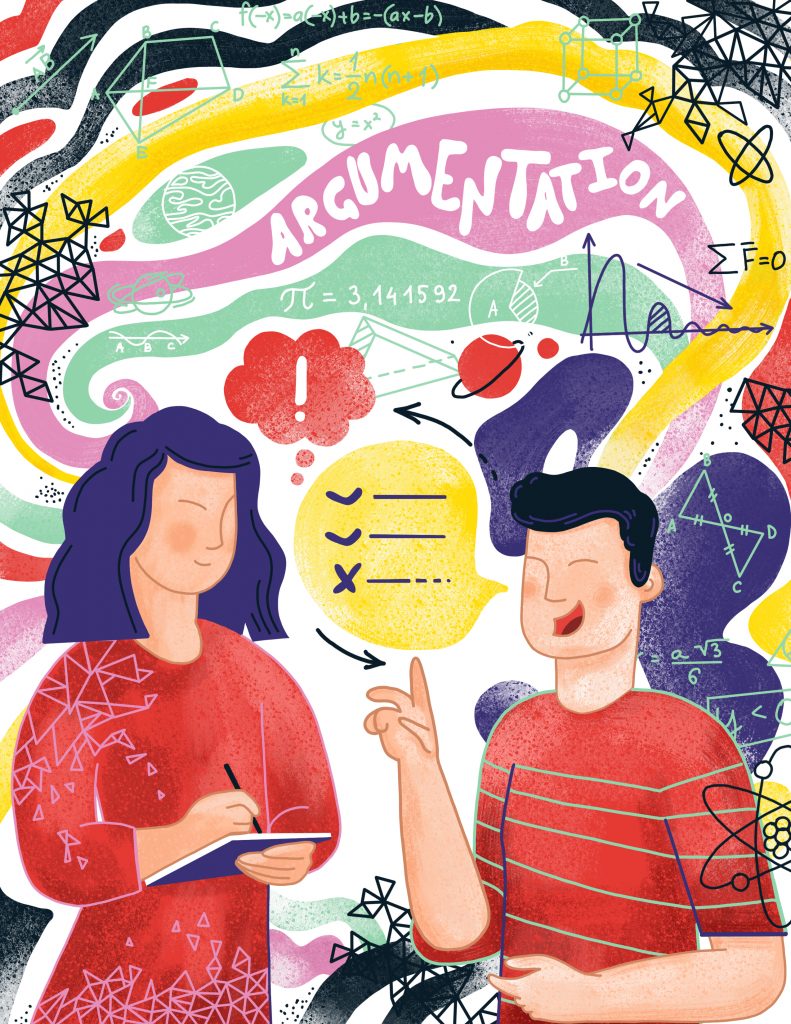Learning to argue is learning to think.
Michael Billing, 1996
- Should animals be used in research?
- Should an alcoholic be allowed a liver transplant?
- Is it right to seek human egg cells for scientific research?
- Are video games a healthy form of entertainment?
- Is the hazard of climate change greater than that posed by a nuclear disaster?
Argumentation is a set of skills that involve justifying a prediction or explanation through evidence and theory to persuade others of one’s claim. In science, constructing evidence-based arguments involves an interplay between generating valid arguments and evaluating counterevidence.
Toulmin’s (1958) definition of argumentation is commonly cited in the literature. Toulim defines argumentation as “an assertion and its accompanying justification.” The reasoning involved in this process links the claim to sufficient evidence to develop a justification that aligns with the claim. In educational settings, the claim-evidence-reasoning framework develops students’ critical thinking skills and communication skills.
The Role of Content Knowledge in Argumentation
Several research studies suggest that students’ content knowledge greatly impacts their decision-making of scientific issues. To construct and defend their evidence-based arguments with scientific concepts and theories, students need a solid understanding of science content. Good command of subject matter equips them with the knowledge to argue for or refute a particular issue, taking into account the ethical and social implications of their decisions.
Integrating argumentation with science content adds a layer of meaning to students’ understanding. From a constructivist perspective, argumentation is associated with conceptual change. It enhances students’ understanding of content and hones their skills as they formulate an evidence-based argument. Students can question, justify, and evaluate their own and others’ reasoning and collectively construct their knowledge.
Argumentation is a powerful cognitive-linguistic skill. It increases students’ voice in the classroom. Students externalize their thinking as they engage with science knowledge to construct meaning and provide reasoning. Depending on the issue, students might develop consensus or might maintain multiple viewpoints. This highlights science as a way of thinking rather than a mere set of concepts and facts.
What are the Challenges of Teaching Argumentation?

- Dialogic arguments are associated with tentativeness which teachers and students generally dislike. It opposes the tried and tested strategy of right-wrong answers. Students are familiar with Yes-No questions and short phrases to formulate their answers. More often than not, teaching and learning in science classrooms focus on uncontested, discrete facts and ready-made conclusions. This common approach does not serve the goal of promoting reasoning skills.
- Students may face difficulties as they engage in argumentation to express their ideas. They might find it challenging to link (what appears to be) disconnected pieces of content knowledge to create an adequate argument.
- Students might also lack the motivation to master argumentative skills. If they do not see the value of argumentation activities, they might perceive it as ‘too much work’. Additionally, students generally do not question information presented to them and might not express the desire to discuss a topic in depth.
- Some might be hesitant to share their opinions in front of the class. For students to listen to their peers, argue, critique, and question ideas in a persuasive discourse, they must be confident that the classroom environment is a safe space.
- Most science educators have not received formal training in the teaching of scientific argumentation. Designing learning environments for the successful integration of argumentation into classroom instruction can be challenging and complex for teachers.
- Teachers often struggle with insufficient time to teach argumentative skills and are under pressure with a heavy teaching workload. These conditions create a tension between the teachers’ willingness to integrate argumentation in their instructional plans and the need to cope with content-heavy curricular demands.
- Teachers might find it difficult to develop questions for augmentation lessons.
What is the Role of Science Educators?
Argumentation should be explicitly taught. However, the process is not a set of discrete skills and actions. It is a collective activity that develops with practice, over time, within supportive learning environments.
- An authentic learning environment should be designed to facilitate argumentation in practice. It requires the teacher to create the conditions for students to engage with argumentative discourse through appropriate activities.
- The teacher may play the devil’s advocate to stimulate further justification of arguments by proposing an alternative claim or counterevidence (rebuttal).
- Teachers may provide students with prompts to use scientific terminology or their content knowledge to build a valid argument.
- Collaboration enhances argumentative interactions. Working in groups may help students express themselves, particularly those who shy away from participating in class discussions. Students exchange ideas, identify different perspectives and viewpoints, and collectively construct meaning.
- Students also need tools to help them construct arguments. For example, “I think …because …”. It is not only important for teachers to assess the students’ ability to reason and present their arguments, but also to monitor the process by which they have reached their decision based on their argument. Students are encouraged to evaluate why some arguments are better than others.
- Teachers must enforce avoiding ad hominem, arguments that attack the person and not the claim. Argumentation is a social practice during which students debate their peers as they construct and critique other arguments, not people. Students vary in their degree of openness to new ideas and may hold tightly to their prior beliefs. These factors might create personal tension among students, reducing the likelihood of experiencing a change in knowledge base.
How can Science Educators Assess Arguments?
Argumentation makes thinking and reasoning visible but, unlike written assessments, it is not collected and documented for the teacher to refer to and grade at a later time. Argumentation is fluid and non-linear. The teacher may need to follow and simultaneously evaluate several lines of thought.
Educational literature on argumentation recommends formative assessments for argumentation activities. One common formative tool is DiALoG (Diagnosing Argumentation Levels of Groups), a tablet-based tool that enables teachers to score classroom argumentation in real-time across multiple dimensions.
Research suggests using the basic structural features of an argument. Identifying which component of an argument is missing may help the teacher assess the quality of the argument.
Teachers can use the following criteria when evaluating arguments:
- Claim: What is the claim?
- Data: Does the argument have data to support the claim?
- Warrant: Does the argument link the data to the claim?
- Backing: Are there further justifications for why the data and claims are valid?
- Rebuttal: How can counter-arguments be refuted?
How can teachers assist students in developing their reasoning? Students may be challenged to consider the following additional questions:
- What evidence supports your final decision(s)?
- How can you justify your argument?
- Is the explanation sufficient?
- What are the possible pros and cons of your decision(s)?
- Under which conditions would your decision be better or more balanced?
- Given this issue, if anyone does not agree with you, how can you convince them to adopt your decision(s)?
- What evidence would you consider to change your initial decision(s)?
Argumentation is a cognitively demanding learning experience. Reflecting on the process of argumentation is an essential step for students to identify any change in their thinking, particularly if they thought the opposing argument was stronger.
Embedding argumentation as a tool in science curricula is one way by which science educators can prepare students as current and future citizens for meaningful participation in their communities. As students learn about and with argumentation, they become able to make informed decisions about scientific issues in their society. When students are encouraged to challenge socio-scientific issues, they not only develop argumentation skills, but are also empowered for social commitment.
References
- Arias, Anna Maria, P. Sean Smith, Elizabeth A Davis, John-Carlos Marino, and Annemarie S Palincsar. 2017. “Justifying Predictions: Connecting Use of Educative Curriculum Materials to Students’ Engagement in Science Argumentation.” Journal of Science Teacher Education 28 (1): 11–35. https://doi.org/10.1080/1046560X.2016.1277597.
- Billig, Michael. Arguing and thinking: A rhetorical approach to social psychology. Cambridge University Press, 1996.
- Henderson, J. Bryan, Nicole Zillmer, April Holton, Steven Weiner, Eric Greenwald, Megan Goss, M. Lisette Lopez, Christina Morales, P. David Pearson, and Katherine L McNeill. 2021. “How Science Teachers DiALoG Classrooms: Towards a Practical and Responsive Formative Assessment of Oral Argumentation.” Journal of Science Education and Technology. https://doi.org/10.1007/s10956-021-09921-4.
- Holton, April B., J. Bryan Henderson, M. Goss, and E. Greenwald. “Developing DiALoG: A Digital Formative Assessment Tool to Support Student and Teacher Learning of Oral Argumentation.” In International Conference for the Learning Sciences (ICLS), London, England. 2017.
- Khishfe, Rola. 2021. “Explicit Instruction and Student Learning of Argumentation and Nature of Science.” Journal of Science Teacher Education 32 (3): 325–49. https://doi.org/10.1080/1046560X.2020.1822652.
- McNeill, Katherine L, Rebecca Katsh-Singer, María González-Howard, and Suzanna Loper. 2016. “Factors Impacting Teachers’ Argumentation Instruction in Their Science Classrooms.” International Journal of Science Education 38 (12): 2026–46. https://doi.org/10.1080/09500693.2016.1221547.
- Özdem Yilmaz, Yasemin, Jale Cakiroglu, Hamide Ertepinar, and Sibel Erduran. 2017. “The Pedagogy of Argumentation in Science Education: Science Teachers’ Instructional Practices.” International Journal of Science Education 39 (11): 1443–64. https://doi.org/10.1080/09500693.2017.1336807.
- Ping, Irene Lue Leh, Lilia Halim, and Kamisah Osman. 2020. “EXPLICIT TEACHING OF SCIENTIFIC ARGUMENTATION AS AN APPROACH IN DEVELOPING ARGUMENTATION SKILLS, SCIENCE PROCESS SKILLS AND BIOLOGY UNDERSTANDING.” Journal of Baltic Science Education 19 (2): 276–88. https://doi.org/10.33225/jbse/20.19.276.























